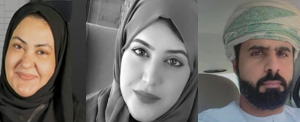On 10 June 2020, Sultan Haitham bin Tarik issued decree No. 64 of 2020 establishing the Cyber Defence Centre, and accordingly on 14 June 2020 the Official Gazette No. 1345 published the method of work of this centre, which includes 11 articles. The Gulf Centre for Human Rights (GCHR) and the Omani Association for Human Rights (OAHR) are concerned that this new regulatory system will severely compromise Internet freedom and freedom of expression.
The Cyber Defence Centre system gives absolute control to the Internal Security Service (ISS) – known for its continuous suppression of public freedoms, including freedom of expression on the Internet – over Internet users inside the country, their devices, and the data they save on these devices.
According to paragraph (3) of Article (1), the head of the ISS is the de facto head of the Cyber Defence Centre, while paragraph (6) of the same article defines electronic security as “securing and protecting information networks, the communication network, information systems, and operations of collecting and exchanging information using any electronic means.” Paragraph (7) states that the concerned parties are “Civil and military government agencies and private sector institutions within the Sultanate that are related to the jurisdiction of the centre, and other bodies that are determined by a decision of the president.”
Undoubtedly, all of this means that the Cyber Defence Centre has become a division of the ISS and on its behalf controls not only the entire Internet for all sectors of society and the general public, but also the collection and exchange of information by all electronic means, and this includes all personal devices, including personal computers and mobile phones. Paragraph (1) of Article (11) affirms that the centre is affiliated with the ISS, as it stipulates that: “The financial resources of the centre consist of the following: (1) The financial allocations to the centre from the budget of the National Security Agency.” This means that it applies in its policies and work the same common patterns adopted by the ISS that are repressive in nature, which always seeks to silence other opinions and restrict the civil and human rights of citizens on the Internet.
Paragraphs (3) and (5) of Article (4) give the right to the Cyber Defence Centre to examine the devices and networks of all agencies and to receive the required documents and data. It stresses that all parties are obliged to do so as stipulated as follows, “The concerned authorities are committed to the following:
(3) Providing the centre with the documents, information, data and reports necessary for it to carry out its functions, and enabling it to examine the devices, networks, systems and software of these agencies.
(5) Obtaining the approval of the centre before storing any sensitive data, or processing it outside the Sultanate.
This simply means that the ISS fully controls the devices and data of all institutions and groups of society and may use this control to provide evidence and information about Internet activists who express their opinions contrary to the government on public issues of concern. This may result in threatening and imprisoning Internet activists, and using the judiciary against them if required.
Article (6) has been specifically designed to give the Cyber Defence Centre all the competencies that make it one of the departments of the ISS, which includes 19 specialties. What causes concern to GCHR and OAHR are the specialties mentioned in paragraphs (5), (9), (12) and (19) where they stipulate that, “In order to achieve its goals, the centre shall exercise the following duties:
(5) Setting conditions, characteristics, functional standards or technical specifications for any devices or systems related to the field of electronic security, and agreeing to use, import or circulate them in the Sultanate.
(9) Monitoring the networks of the concerned authorities, and investigating any electronic threats, which the centre – after obtaining the approval of the Chairman of the Committee – may isolate if the need arises in the event that the electronic security standards are not adhered to, in order to address any threats that might harm the national security system, or the Sultanate’s economy, or its international and regional relations.
(12) Carrying out a security check and auditing the concerned authorities whenever necessary to ensure their compliance with the standards and policies issued by the centre.
(19) Informing and reporting regularly to the Council on cyber security issues of a national dimension.
Paragraph (5) gives authority to the ISS through one of its departments, the Cyber Defence Centre, to import advanced hardware and software that blocks websites or closely monitors human rights activities on the Internet. Whereas the other paragraphs (9), (12) and (19) are considerably loose paragraphs, as the ISS represented by its president has the authority not only to monitor any electronic network in the country, but also to isolate it for reasons that can be encapsulated, apparently to be linked to the “national security system, the Sultanate’s economy, or its international and regional relations” and “cybersecurity issues with a national dimension.” But in reality, GCHR and OAHR believe it will lead to the silencing of other opinions, the pursuit of Internet activists, and significant restrictions on freedom of opinion and expression, by giving full control to the ISS over cyberspace.
The authorities’ implantation of the Cyber Defence Centre system at this particular time, taking advantage of the world’s preoccupation with the Coronavirus (Covid-19) pandemic, is an open attempt to legalise Oman’s repressive patterns and strive aggressively to impose full control over the Internet and to impose collective surveillance of all citizens and institutions, including their networks, their devices, and the data they are trading, which seriously threatens their basic rights.
GCHR and OAHR call on the government in Oman to immediately rescind the decree establishing the Cyber Defence Centre system in order to preserve the open space for citizens to exercise their legitimate right to freedom of expression on the Internet. The authorities must end all forms of repression against other opinions on the Internet and offline. The task of preserving the Internet and making it a tool that contributes to building a prosperous future for all citizens must be entrusted to a group of independent academics and technologists in cooperation with the Ministry of Technology and Communications and other civil bodies specialised in Internet governance, so that the mission of the security services is limited to addressing issues of a criminal nature only.
 Omani Association for Human Rights
Omani Association for Human Rights


